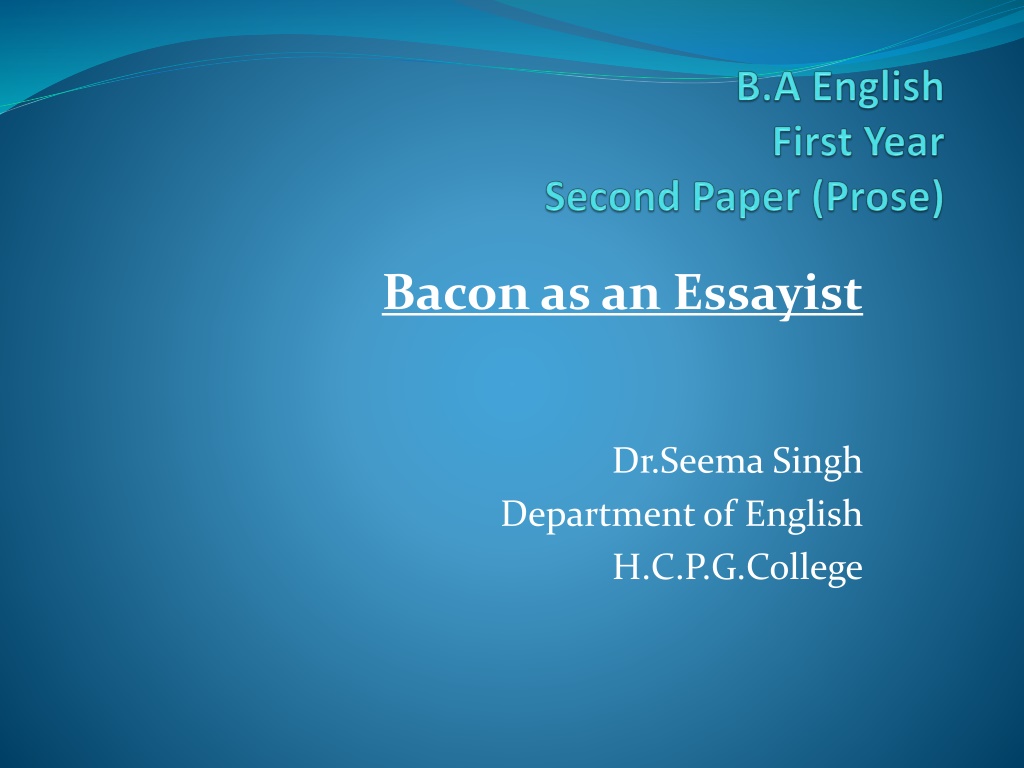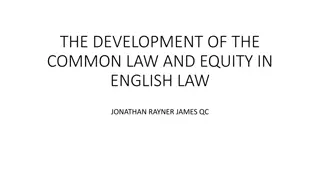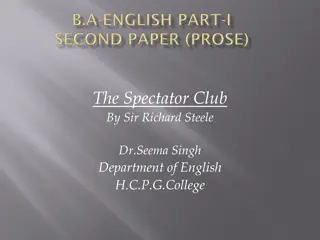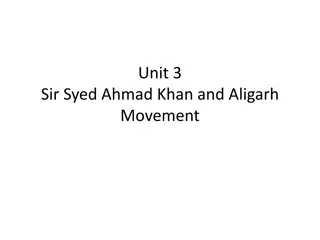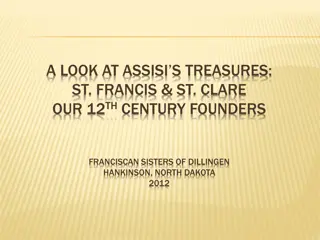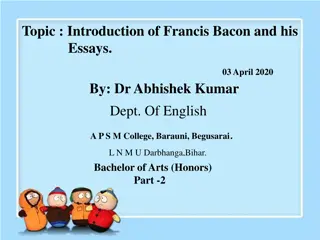The Influence of Sir Francis Bacon as an Essayist
Sir Francis Bacon, regarded as the father of English essay, revolutionized the English prose with his profound and objective essays. He emphasized practicality and utilitarianism in his works, offering counsel on leading a successful life. Bacon's essays evolved through multiple editions, showcasing his keen observations of human nature. While inspired by Montaigne, Bacon's essays differed in style, focusing on detached and impersonal wisdom rather than personal reflections. Covering a wide array of topics, Bacon's essays remain timeless guides for intellectual exploration and self-improvement.
Download Presentation

Please find below an Image/Link to download the presentation.
The content on the website is provided AS IS for your information and personal use only. It may not be sold, licensed, or shared on other websites without obtaining consent from the author. Download presentation by click this link. If you encounter any issues during the download, it is possible that the publisher has removed the file from their server.
E N D
Presentation Transcript
Bacon as an Essayist Dr.Seema Singh Department of English H.C.P.G.College
Francis Bacon is the first great English essayist. He enjoyed a glorious reputation and considered to be the father of English essay. He remains for the sheer mass and weight of genius. His essays introduce a new form of composition into English prose. Bacon charged his essays with the serious spirit and stately manners of Seneca. For him his essays were dispersed meditations and receptacle for detached thoughts. He is practical under the influence of Machiavelli. Utilitarianism is obvious in his essays. He instructs how to lead a successful life. That s why his essays are called counsels civil and moral.
Three Editions of Bacons Essays: Bacon sponsored this new literary form in English with the publication of his ten essays in 1597. It grew to thirty-eight in the edition of 1612. The number reached fifty-eight in the final issue of 1625. These essays are the results of his direct observations of men and matters. Bacon and Montaigne: Bacon borrowed the form of essay from Montaigne, the French essayist. Bacon and Montaigne share the form of essay but not its spirit. Montaigne is personal, familiar and prolific. But Bacon is formal, curt and impersonal. Montaigne appeals to the heart but Bacon to the head. Thus these two great essayists present a very sharp and interesting contrast.
Impersonal and Objective: Bacon s essays are capsules of impersonal wisdom. They may not give immediate pleasure but give lasting guidance. They are objective and logically constructed. Thus as an essayist Bacon is not friendly, confidential, intimate and familiar with the reader. His essays are for the most part detached and impersonal. In fact, Bacon s essays bear a close imprint of his personality, though he is not disposed to unbend himself in his works. On this basis Pope s following statement is appreciated: If parts allure thee, think, how Bacon shined, The wisest, the brightest and the meanest of mankind.
Wide Range of Topics: Bacon wrote on a wide range of topics. He passes from religion and empire to gardens and buildings. In Montaigne and Lamb, the subject is unimportant but in Bacon subject always is important. He may be unsystematic in his treatment but he never wanders beyond his bounds. Themes of Bacon s Essays: The themes of Bacon s essays are various. They range from Goodness to Gardens and from Envy to Masques and Triumphs. The essay Of Studies is about books and reading. Here Bacon explains reasons and purpose of study. At the same time he suggests the modes of selecting the books and manner of study. He advocated the use of practical knowledge.
Bacons Style: Bacon employed a unique style. This is important for lucidity, clarity, economy, precision, directness, masculinity and mathematical plainness. His essays seem like a collection of short and pithy maxims with tremendous compression. Each sentence can convey a deep and concentrated meaning. Due to this, Bacon s style is called aphoristic. Bacon considered this style suitable for the spirit of enquiry. In his early essays the sentences are short, crisp and sententious. There are few connectives. Though there is no continuity, there is a strong sense of rapid movement. As Bacon s essays are argumentative in nature, his style becomes antithetical. With an impartial air, he balances the opposing arguments. There are number of quotations and allusions in his essays.
Bacons style changed in the later editions. It became more elaborate. Connectives were used frequently and the style became less formal. His images and figures of speech are simple. They clearly state the ideas. Flexibility, wit and fun are also some important features of his style. In short, Bacon is a great essayist. To English literature his essays are priceless acquisitions. Legouis has rightly remarked These essays are the classics of English prose . Reading maketh a full man; conference a ready man; and writing an exact man. And therefore, if a man write little, he had need have a great memory; if he confer little, he had need have a present wit: and if he read little, he had need have much cunning, to seem to know, that he doth not. Of Studies
